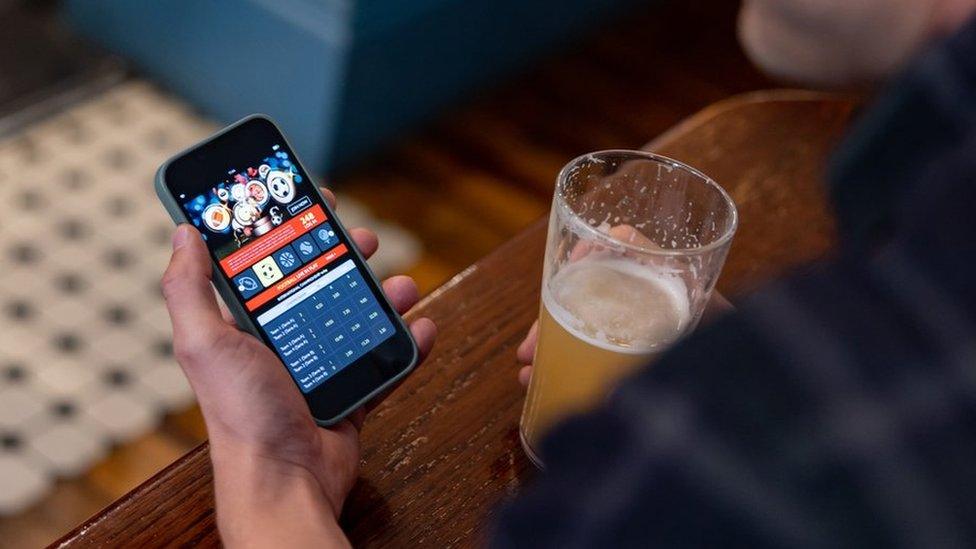'I was a gambling addict who stole £1.3m and went to prison'
- Published
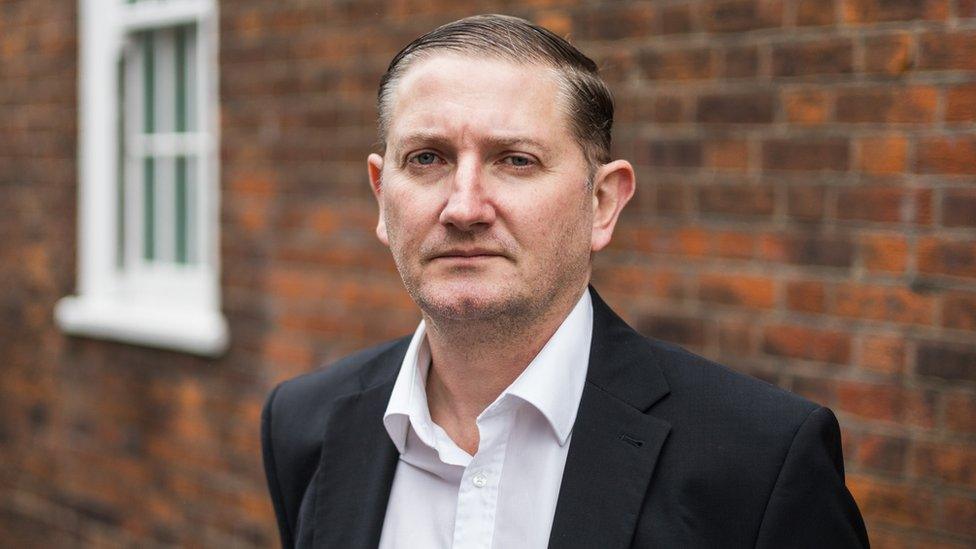
Andy May was released from prison in the summer after stealing more than £1m from his employer
Andy May appeared to be living a comfortable life with his partner and two children in a rural Norfolk village when he received a knock on the door.
The finance manager's only previous brush with the law had been a solitary speeding ticket.
But police officers had come to question him. The 47-year-old had stolen £1.3m from his employer to fund a gambling addiction and he was later sentenced to four years in prison.
Here, in his own words, Andy talks about how important it is to seek help if you have a gambling problem, before it escalates out of control.
'I spent my way through all the money we had'
I used to have a £5 or £10 bet on the football at weekends. I never saw that as being dangerous. But as I worked my way upwards in life, the ability to borrow money came along.
Without me realising, the gambling crept up on me. I started betting £15 a week and then £50. And then £50 became £100, which soon became £500 a month.
Listen: Norfolk gambling addict tells his story
I was chasing losses which you know you shouldn't do. But when you're in that moment, you do it anyway. That was around 2007. My family then became aware of the problem. My partner and I were buying our first home but I had gambled away the deposit. My parents helped me and I promised never to gamble again. I went seven years from then without having a bet, not even buying a lottery ticket.
But that seven years was down to pure willpower. I didn't try and get help. I lived a normal, happy life and gradually forgot about my past troubles.
Fast forward to the summer of 2014, I was at home watching the World Cup in Brazil. An advert came on TV offering a free £50 bet. I sat there and thought, well, what's the harm? Within two weeks, I was back to betting at the levels I had finished at previously.
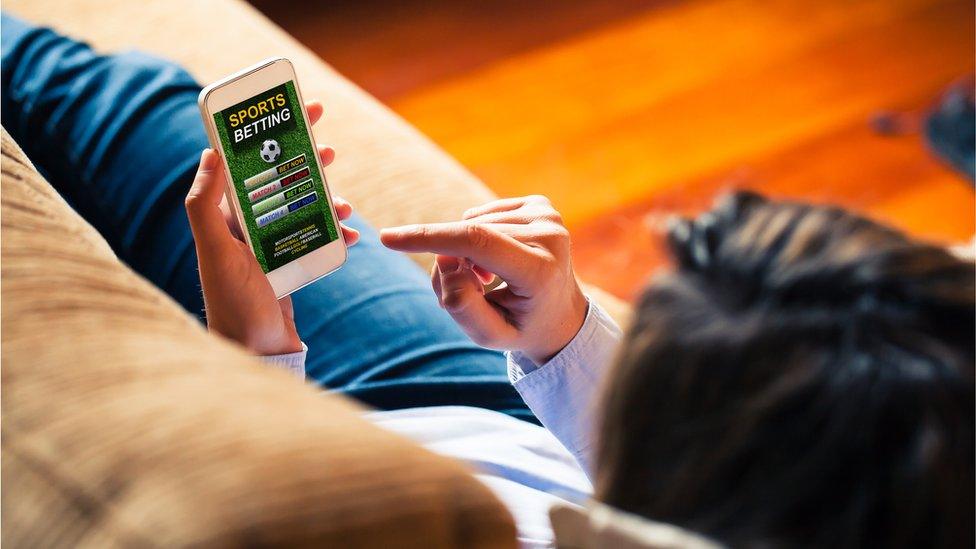
Andy didn't place a bet for seven years but started gambling again when he saw an advert on TV
Six months later, I'd spent my way through £50,000. I started to take out credit cards and get myself into more debt. By February 2015, I had completely run out of money. I was the finance manager for a company that I'd worked for for 20 years and had a company credit card. On my lunch breaks I started going to a cash machine and gambling their money.
By now I was betting on anything that I could, from the number of corners in a game to yellow cards, usually online on my phone or my laptop in the office. No amount of money would have been enough. I used to come home at lunch so I could grab the bills and did the same at work. I started to pay my own personal credit card off with the company's bank account. Over the period of four and a half years, I stole more than £1.3 million pounds from my employer.
Everything was out of control. The only thing I was thinking about was gambling. I was stealing money left, right and centre. I finally got caught at work in the summer of 2019 and it was almost a relief when I was fired. But I lied to my family and said I'd fallen out with my boss, and within a fortnight I'd found a new job.
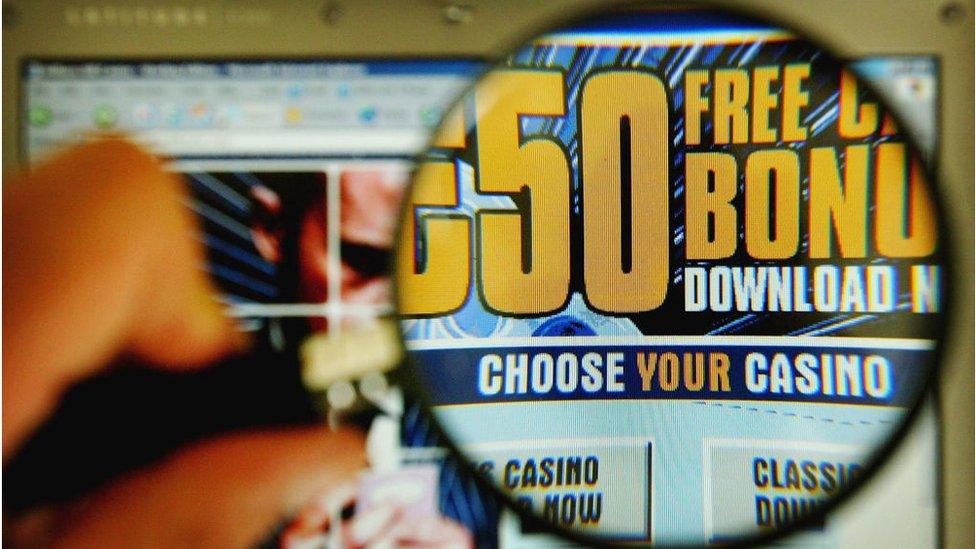
A £50 free bet lured Andy back into the world of gambling after a seven year break
It took a year for the police to arrive and on a Saturday evening in June 2020 there was a knock at the door. My partner answered. I knew right there and then what they wanted.
Six months later I was at my local court and in June 2021 I was sentenced to four years in prison.
Watching my kids go to school on the day I went to prison was the worst day of my life. I had explained it as best as I could to them but they didn't have a proper grasp of it. We didn't see each other for six months after that. The impact my addiction and crime had on those closest to me has been far worse than prison ever was.
Before I went inside I was put in touch with an incredible charity called Epic Restart Foundation, external which helped me start to rebuild my life. I spoke to people who had moved on from their addiction and they gave me hope.
I went to prison with the intention of keeping my head down. I spent six months in HMP Peterborough in a cell with bars on my window that I shared with a stranger. It was 11 steps in one direction and seven in the other with a toilet in the corner, a short distance away from where you ate.
The one thing I wasn't prepared for was the sheer boredom. We were locked up for 23 hours a day. You would be unlocked to shower, walk around the exercise yard and get food but apart from that you were on your own. Eventually I was able to get to the library once a week.
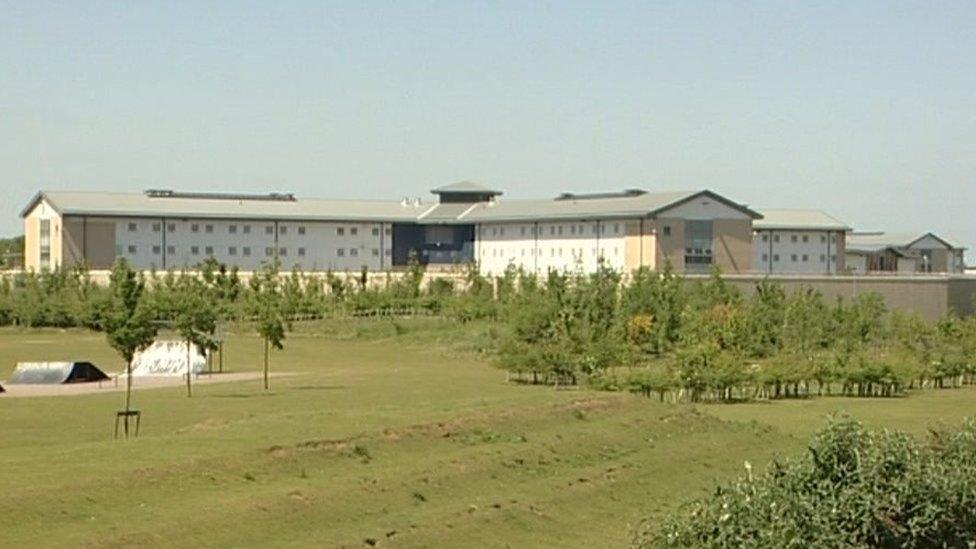
The men's prison at HMP Peterborough holds 800 men
I spent the last 18 months of my sentence at an open prison in Norwich where you go out to work in the community. I started working for the construction firm Kier Group, which runs an employment programme for ex-offenders. I asked my governor if I could start going to my local Gamblers Anonymous, external meeting and I still go every week. I served two years in prison in total and was released on licence in the summer.
I thought no-one would ever employ me again but I'm still working for Kier, which has really helped me get my life back on track.
I had to pay everything I had available to me back to my employer. The records from the betting companies showed that I spent £1.6m and I stole just over £1.3m of that, most of which the betting firms gave back to my boss.
Looking back, the lowest point wasn't actually going to prison but whilst I was stuck in the midst of the gambling. That was when I was at my worst mentally.
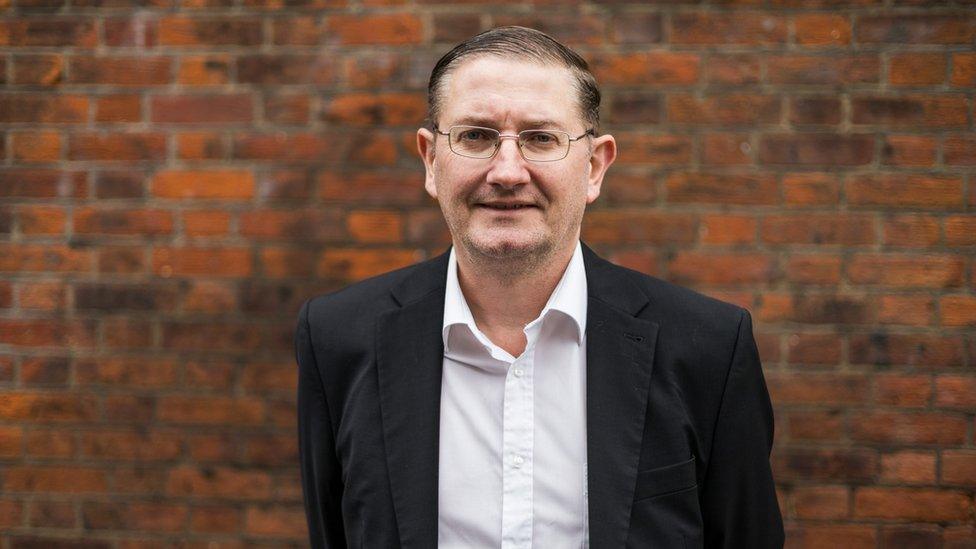
Andy is working with the charity GambleAware on a campaign to reduce the stigma often associated with gambling addiction
I had to go to prison for the crime I had committed, you can't do what I did and expect anything else. An important part of recovery for me is to take ownership and be accountable for what happened. I'm not proud of anything I have done but I am learning to not be ashamed.
I can only imagine the impact my offending had on my former colleagues, some of whom I'd known for decades. An apology is a pretty weak statement given everything that happened, but it's the best that I can do. There are so many things I wish I could change.
I'm volunteering with the charity GambleAware, external to share my story. I made a promise to myself when I went to prison that I would not shrink away. The only thing I can do is to speak out with the hope of trying to persuade others to act differently.
Do I think that I could ever gamble again? Sadly the answer is probably yes. But what I focus on every single day is making sure that I don't, today. There's nothing I could possibly win that would make my life better and I have everything to lose. I'd be gambling with so many things that aren't money, like my recovery, all of the relationships I have managed to save and the trust people have rebuilt in me. There's just no point.
My life has changed considerably due to my addiction, but things are far better now than I ever thought they could be when I first stepped into that cell and I am thankful to still have a close relationship with my children.
I realise that for many people gambling is a completely safe, enjoyable and harmless leisure activity. For me it started as that but transcended into something very different.
I hope this might spark a thought in someone's mind to start a conversation before things go too far. Perhaps someone with a gambling problem might read this and reach out for support. There is a way through it. Try and find that bravery to talk. I wish I had been brave enough to speak out sooner.
As told to Charlie Jones
If you've been affected by addiction, help and support is available via BBC Action Line.

Follow East of England news on Facebook, external, Instagram, external and X, external. Got a story? Email eastofenglandnews@bbc.co.uk , externalor WhatsApp 0800 169 1830
Related topics
- Published17 March 2021
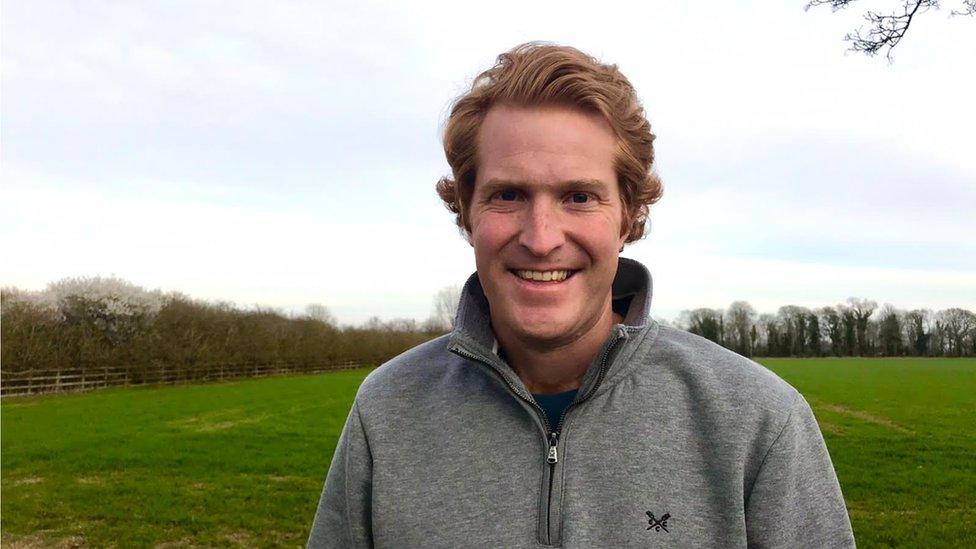
- Published2 July 2023
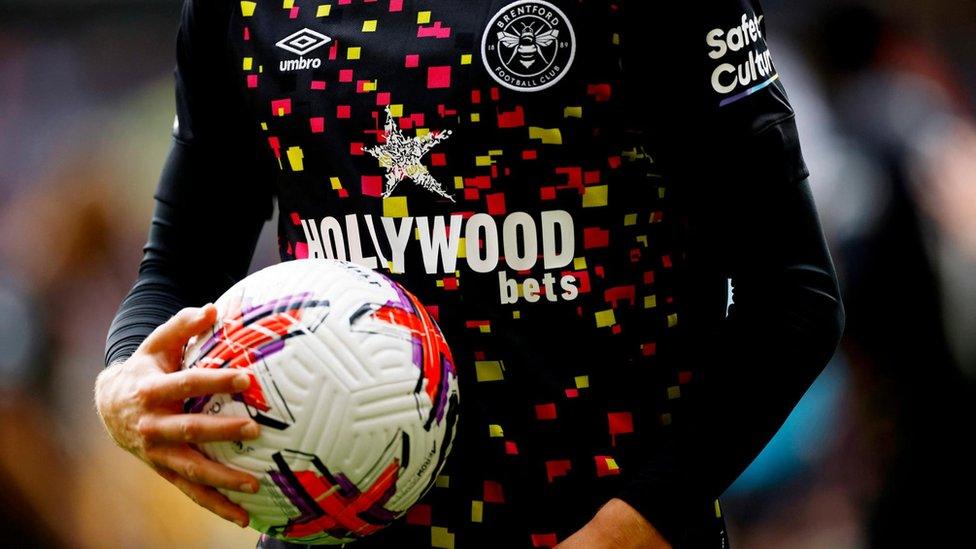
- Published30 March 2021
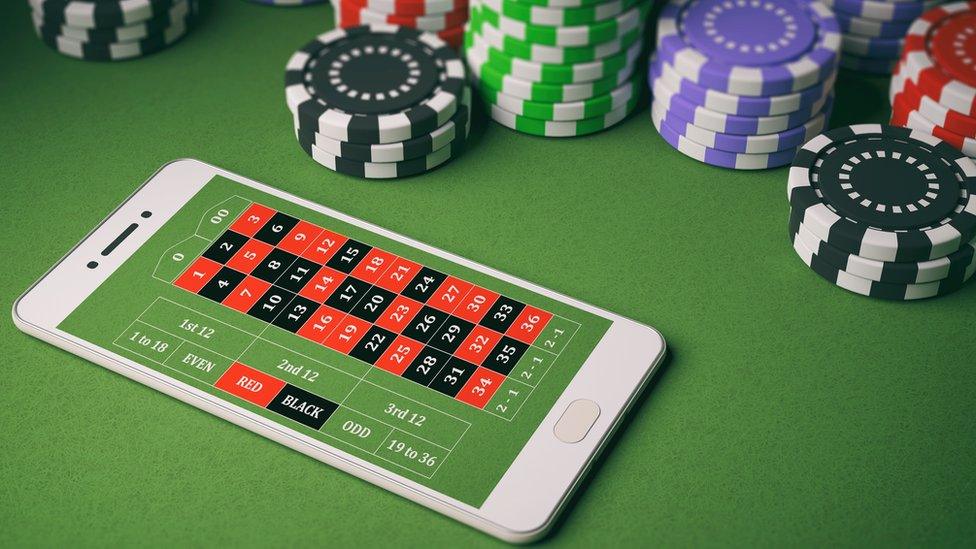
- Published21 February 2023
